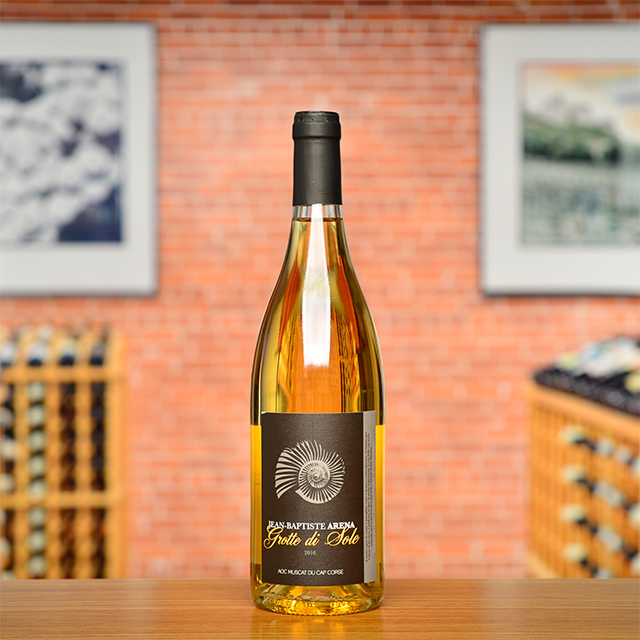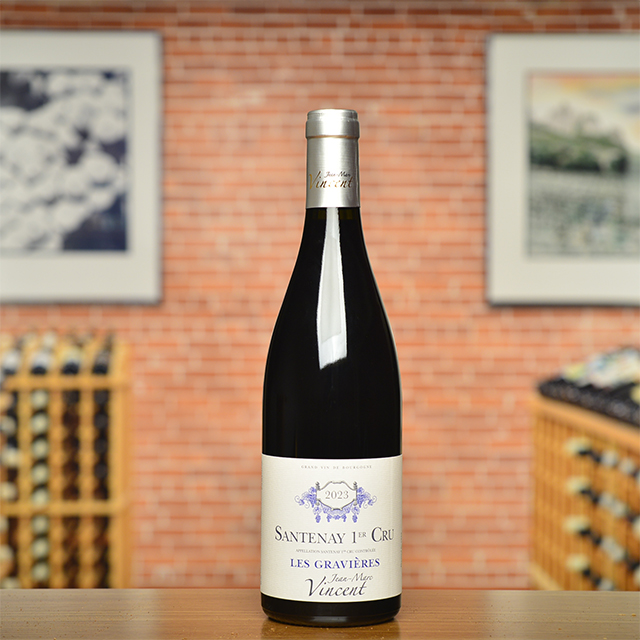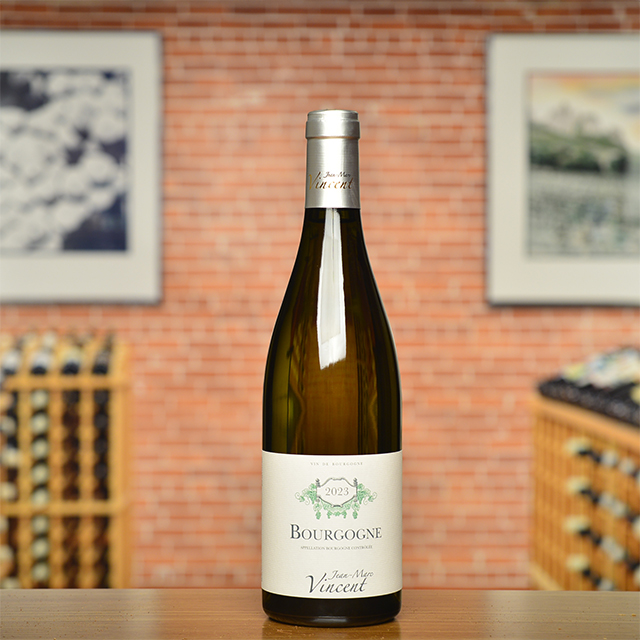Notify me
2016 Muscat du Cap Corse “Grotte di Sole”
Jean-Baptiste Arena
The Arena sons are as eager to think outside the box and execute novel ideas as they are to honor the local winemaking traditions that have come to define Corsica. One such tradition, Cap Corse’s celebrated dessert wine, represents one of the most fascinating and intriguing expressions of Muscat in the world. Talk about a sense of place: Muscat grown here seems to soak up the smells of its surroundings to give a uniquely Corsican perfume. It radiates Mediterranean sunshine, suggesting maquis wildflowers along with hints of wild mint and other herbs. Try splashing a dollop of the nectar over a seasonal fruit salad, then pour each of your guests a glass to accompany it—they are sure to be wowed.
—Anthony Lynch
| Wine Type: | dessert |
| Vintage: | 2016 |
| Bottle Size: | 750mL |
| Blend: | Muscat |
| Appellation: | Muscat du Cap Corse |
| Country: | France |
| Region: | Corsica |
| Producer: | Jean-Baptiste Arena |
| Winemaker: | Jean-Baptiste Arena |
| Vineyard: | Planted in 1982, 1992, 1995, 1 ha |
| Soil: | Clay, Limestone |
| Aging: | Muscat de Cap Corse Grotte di Sole is a muted wine that ages for 2 months in stainless steel tank |
| Farming: | Organic (certified) |
| Alcohol: | 15% |
More from this Producer or Region

2021 Patrimonio Rouge “Grotte di Sole”
France | Corsica
Think classic, spirited Sangiovese with a wilder, slightly darker-fruited, herb-singed character from the ancient seaside maquis-studded limestone.

2021 Vin de France Blanc “Morta Maio”
France | Corsica
Lightly golden in color, it conjures up a day spent in the sun: seabreezes and ripe honeydew, including its subtle, savory rind.

2013 Vin de France Blanc “Grotte di Sole”
France | Corsica
Golden ripe Vermentinu berries are responsible for this fleshy, succulent dry white.

2019 Patrimonio Rouge
France | Corsica
Muriel Giudicelli’s Patrimonio rouge is elegant, deep, bursting with ripe black fruits, silky smooth, and offering great length.

2022 Patrimonio Rouge “Grotte di Sole”
France | Corsica
Think classic, spirited Sangiovese with a wilder, slightly darker-fruited, herb-singed character from the ancient seaside maquis-studded limestone.

2019 Muscat du Cap Corse “Grotte di Sole”
France | Corsica
See why Cap Corse’s famous Muscat tastes like no other dessert wine in the world.

2023 Patrimonio Rouge “Morta Maio”
France | Corsica
A vibrant tonic akin to a savory brew of muddled stone, wild herbs, and salty sea air.

2022 Vin de France Blanc “Morta Maio”
France | Corsica
Lightly golden in color, it conjures up a day spent in the sun: seabreezes and ripe honeydew, including its subtle, savory rind.

2024 Patrimonio Blanc “San Giovanni”
France | Corsica
A thirst-quencher with uncommon pedigree.

2022 Vin de France Blanc “Grotte di Sole”
France | Corsica
Harvested early and fermented in stainless steel tanks to maintain a vibrant quality, balanced by lush notes of flowers, spice, and citrus that will pair well with any number of foods.
 /
/
About The Producer
Jean-Baptiste Arena
About The Region
Corsica

I first set foot on the island in 1980. I remember looking down from the airplane window seeing alpine forest and lakes and thinking, uh oh, I got on the wrong plane. Then suddenly I was looking down into the beautiful waters of the Mediterranean. Corsica is a small, impossibly tall island, the tail of the Alp chain rising out of the blue sea.—Kermit Lynch
Kermit’s first trip to the island proved fruitful, with his discovery of Clos Nicrosi’s Vermentino. More than thirty years later, the love affair with Corsica has only grown as we now import wines from ten domaines that cover the north, south, east, and west of what the French affectionately refer to as l’Île de Beauté.
Corsica is currently experiencing somewhat of a renaissance—interest has never been higher in the wines and much of this is due to growers focusing on indigenous and historical grapes found on the island. Niellucciu, Sciarcarellu, and Vermentinu are widely planted but it is now common to find bottlings of Biancu Gentile and Carcaghjolu Neru as well as blends with native varieties like Rossola Bianca, Minustellu, or Montaneccia.
As Kermit described above, Corsica has a strikingly mountainous landscape. The granite peaks top out above 9,000 feet. The terroir is predominantly granite with the exception of the Patrimonio appellation in the north, which has limestone, clay, and schist soils.The wines, much like their southern French counterparts make for great pairings with the local charcuterie, often made from Nustrale, the native wild boar, as well as Brocciu, the Corsican goats milk cheese that is best served within 48 hours of it being made.
More from Corsica or France
Extra Virgin Olive Oil “Fruité Douce”
Domaine de Marquiliani | Corsica
2013 Vin de France Blanc “Grotte di Sole”
Antoine Arena France | Corsica
2024 Vin de France Rouge “Sempre Cuntentu”
Domaine Giacometti France | Corsica
2024 Patrimonio Rosé “Cuvée de l’Agriate”
Domaine Giacometti France | Corsica
2024 Île de Beauté “Biancu Marinu”
Yves Leccia France | Corsica
2024 Ile de Beauté Rouge
Domaine de Marquiliani France | Corsica
2023 Bonifacio Blanc “Tarra di Sognu”
Clos Canarelli France | Corsica
2021 Patrimonio Rouge “Grotte di Sole”
Jean-Baptiste Arena France | Corsica
2019 Patrimonio Rouge
Domaine Giudicelli France | Corsica
2022 Corse Figari Rouge
Clos Canarelli France | Corsica
Extra Virgin Olive Oil “Le Moulin de Pauline”
Domaine Marquiliani | Corsica
2023 Vin de France Rouge “Ministre Impérial”
Domaine Comte Abbatucci France | Corsica
Extra Virgin Olive Oil “Fruité Douce”
Domaine de Marquiliani | Corsica
2013 Vin de France Blanc “Grotte di Sole”
Antoine Arena France | Corsica
2024 Vin de France Rouge “Sempre Cuntentu”
Domaine Giacometti France | Corsica
2024 Patrimonio Rosé “Cuvée de l’Agriate”
Domaine Giacometti France | Corsica
2024 Île de Beauté “Biancu Marinu”
Yves Leccia France | Corsica
2024 Ile de Beauté Rouge
Domaine de Marquiliani France | Corsica
2023 Bonifacio Blanc “Tarra di Sognu”
Clos Canarelli France | Corsica
2021 Patrimonio Rouge “Grotte di Sole”
Jean-Baptiste Arena France | Corsica
2019 Patrimonio Rouge
Domaine Giudicelli France | Corsica
2022 Corse Figari Rouge
Clos Canarelli France | Corsica
Extra Virgin Olive Oil “Le Moulin de Pauline”
Domaine Marquiliani | Corsica
2023 Vin de France Rouge “Ministre Impérial”
Domaine Comte Abbatucci France | Corsica
Kermit once said...

Kermit once said...
For the wines that I buy I insist that the winemaker leave them whole, intact. I go into the cellars now and select specific barrels or cuvées, and I request that they be bottled without stripping them with filters or other devices. This means that many of our wines will arrive with a smudge of sediment and will throw a more important deposit as time goes by, It also means the wine will taste better.














